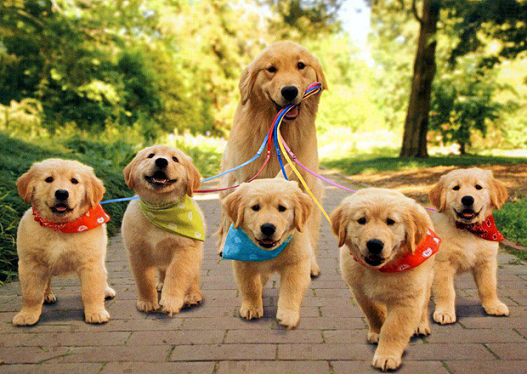What’s In A Breed?
There’s an old saying that says “A dog is a dog is a dog.” While there is a little bit of truth in this saying, it can be very misleading. Yes, it is true that all dogs share much in common. But, one of the most wonderful things about dogs is that they are categorized into breeds, and it is the breed of dog that gives us the most information about its personality, skills, general looks, health problems, life expectancy, etc.. Knowing about the differences between various dog breeds, will let you pick your perfect companion.

Dog Breed Size
For many people, the average adult size of a breed is very important when choosing a dog. The size of a breed can provide useful information since certain characteristics are shared by most big dogs, and other features are shared by small dogs. For example, large dogs are more prone to certain health issues like bloat. On the other hand, small sized dogs are known to be bundles of energy with heavy barking tendencies.
Dog Skills
Dogs are one of the most pliable animals in the world (maybe second only to humans). Throughout history, humans have taken advantage of the plasticity of dogs and used them for a large variety of tasks. Some dogs were bred for herding other animals. These dogs have certain distinctive features that you should be aware of. Similarly, some dog breeds were originally bred for fighting, and consist of rock solid muscle that needs to be toned via particular types of exercise. Other dogs were bred for hunting and tracking, and because of this shouldn’t be let off leash in areas with traffic, because their noses might lead them into an accident. Understanding where each breed has come from, what it was originally designed to do, and how those skills translate into modern life, will go a long way towards helping you pick the breed that is right for you.
Dog Temperament
Every breed has its own personality tendencies. Some breeds are extremely energetic and active. Other dogs are very passive and laid back. Some breeds are very obedient and affectionate, while other breeds can be very stubborn, and independent. Knowing the personality of your dog breed gives you some of the information you need to pick a dog that fits your lifestyle.
Exercise Needs
Each breed of dog has its own set of exercise requirements. Some dogs are active enough inside that they don’t really need outdoor activity. Some very muscular dogs need specific activities in order to tone their muscles. Some of the more intelligent breeds may need more mental exercise than physical exercise. Dogs that were bred for very specific, highly skilled tasks tend to need to activities that simulate those tasks in order for them to remain happy. It is also important to keep in mind that puppies who are over exercised can develop joint problems. Further, some dogs with small noses should only exercise for short periods of time.
Living Conditions
Some dogs can live their entire lives indoors. Other dogs need a yard and still other dogs need a rural environment in which they can roam completely free. Small dogs tend to be best for apartment living. Dogs originally bred for herding or hunting tend to be good outdoor dogs. Some breeds are sensitive to the cold (especially the hairless types) and some breeds are sensitive to the heat (especially dogs with high muscle mass and short noses). Some breeds simply cannot be outdoor dogs because in the breeding process, they may have lost the ability to defend themselves.
Grooming Requirements
One of the most distinctive features about any breed is its fur and hair type. Some dogs have big and fluffy fur. Some dogs have short hair. And some dogs don’t have any hair at all!!! Some dogs have curly hair, some dogs have wired hair and soem dogs have straight hair. Some dogs have single coats and other dogs have double coats. Knowing what type of coat your dog has will give you information to contemplate the amount of grooming and care that your specific breed will need. Grooming requirements range from minimal (a bath once a month) to maximal (daily combing and baths).
Health Issues
Unfortunately, one of the downsides to owning a dog is the likelihood of it developing a debhilitating health issue. Dogs are prone to a very large number of health problems, especially later in life. Watching a member of your family (your dog) suffer is one of the hardest things in life to do. Some families even have to put their dog to sleep to stop the suffering. Nothing hurts worse. There are some things that you can do, however to minimize health issues. First, you should always pick a reputable breeder who is committed to breeding out health problems. Second, you should look for a breed that has a history of minimal health issues. Third, don’t over exert your puppy (this helps prevent joint problems later in life). Fourth, feed your dog the best food possible (I like Science Diet). Fifth, make sure you dog gets daily exercise. Together, you and your dog can live a long and prosperous life together.
![]()







Leave a Reply